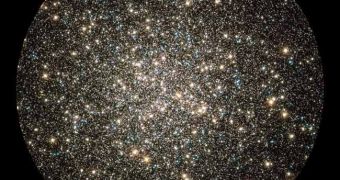Scouring through the northern skies, the Hubble Space Telescope managed to capture a picture of a celestial body that resembles a snow globe. In fact, it is a globular cluster, a celestial formation that comprises over a hundred thousand stars swirling around in a small region of space. This object provides more insight on the structure and features of this type of cosmic item, as well as some hints on the formation of our own galaxy.
This particular globular cluster is called M13 and is situated in the Hercules constellation, some 25,000 light years away from our planet. It comprises more than 100,000 stars, some of them being far older than almost any star in the Milky Way. They are contained in a relatively small portion of space, packed closely together in a sphere of about 150 light years diameter. The density increases geometrically as we get closer to the cluster's core, where it can even reach an amount larger by a factor of 100 than the star density encountered in the vicinity of our solar system.
In fact, the density degree is so high that every now and then they collide with each other, sometimes even giving birth to a novel star, dubbed a "blue straggler". These are blue white, hot abnormal stars which form out of very old ones that siphon material from their neighbors or as a result of their impact. They do look strange in an environment comprised of a vast majority of very old stars – the red giants.
These red behemoths have increased their original diameters by many times, cooling a lot during their puffing up process. This is a fate that even our Sun could have, but luckily we (perhaps even as a species) won't be around to see it. Globular clusters are not a rare encounter; in fact, they surround our galaxy in large numbers, with M13 being just one of about 150 such celestial objects discovered around the Milky Way. Their stars are among the most ancient in the universe, most likely formed prior to our galaxy's disk.

 14 DAY TRIAL //
14 DAY TRIAL //